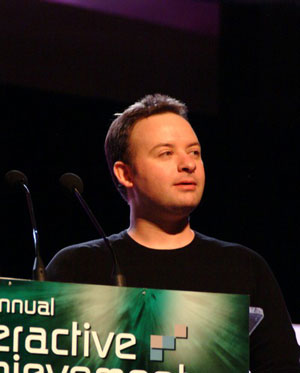 David Jaffe is a member of the Academy of Interactive Arts and Sciences. He spoke at the D.I.C.E. Summit® in 2006. He works for Eat, Sleep, Play.
David Jaffe is a member of the Academy of Interactive Arts and Sciences. He spoke at the D.I.C.E. Summit® in 2006. He works for Eat, Sleep, Play.
Q: How do you measure success?
A: If I contributed in a significant way to a game that has made a large number of people happy, then I consider the work I’ve done to be a success. Huge sacks of money is also a good thing. One out of two ain’t bad — and I’m working real hard on achieving the second one.
Q: If you weren’t in game development, what would you be doing today?
A: Directing movies or writing some sort of fiction. Perhaps editing film.
Q: Are games important?
A: I dunno. I like them a lot. Some of them I love. I think one day they will be more important because they will be able to be “about” more things to more people. But you know, what’s “important” mean anyway? I dig games, they make me happy, and I love working with great teams to make them. The rest, you know, whatever. Not to be flip about it, but it’s just not something I care about. I am grateful to be doing what I do right here and now. The rest is not mine to worry about.
Q: Do you think it’s important for developers to continue playing games?
A: Totally. At least it is for me. Games inspire me and entertain me. Why would I NOT want to keep playing them? Plus, you gotta keep up with the competition. Even if you step out of the mainstream and go independent, you still need to know what the games of the day are all about.
Q: On a practical basis, what’s the one thing you’re going to tackle next?
A: I’m working with my partner to figure out the best place a medium sized game company fits into the market these days. It seems if you are not AAA then you need to be small and independent and casual. It may very well be the days of a medium sized game developer – and a medium sized/medium scoped game for that matter – are long gone, at least on console. I hope not. But either way, we’re trying to look at the current market and find the place where we – a medium sized/scope development house – can contribute to consumers in the most significant and most entertaining way.
Q: What game are you most jealous of?
A: Metal Gear Solid 4. An amazing achievement of both gameplay and mastering the process of game production. To make a game of that scale and at that level of quality clearly took a whole hell of a lot of tenacity and vision.
Q: What’s the one problem of game development you wish you could instantly solve?
A: I hate the constant engine creation that goes on in the business. I would like us to only compete via our creative skills. It’s a pain-in-the-ass knowing that we could have the coolest ideas in the world and they could get sabotaged because our engine is not up to snuff. I hate that a game can often live or die by graphics and the graphics often live or die by how good your engine is. I understand it, but in a perfect world we’d all be using the same game engine and the competition would be about creative ideas, art quality, and how well a team can execute on those ideas, not quality of engines. This happens sometimes in our industry but not as much as I would like.
Q: Tell us one of your recent professional insights.
A: Making games is really hard. I know this is obvious but it’s only recently that I let go of the false idea that the work should just flow out of us and be great. We’ve all been lucky that inspiration has struck a number of times for us on the design, marketing, code, art, animation fronts...but I think for me finally accepting and embracing the idea that, “Man, this is a challenging job much of the time,” has really been a nice realization that has brought a lot of peace of mind to me.
Q: What’s the biggest challenge you see facing the industry?
A: Coming to grips with the customer’s perception of how much money games are worth. With digital distribution, used games, and various price points at real life retail chains, it’s the Wild West regarding how much to charge for a game and what different types of games are actually worth. To pay sixty dollars for an epic like Metal Gear Solid 4 and then ask the player to pay the same amount for a racing game seems insane.
Q: Finally, when you look at the future: is there one great big trend that affects everyone?
A: Digital distribution of games changes the whole thing. Cost to the consumer, development budgets, more niche games, et cetera...
Questions by Evan Van Zelfden